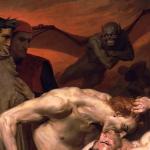 There is film to watch, a poem to ponder, and a lesson to be learned.
There is film to watch, a poem to ponder, and a lesson to be learned.
That’s a good weekend.
The motion picture, no mere movie, The Enchanted Cottage* is hard to find, harder to watch, but worth the effort. Dante’s Purgatory is easy to find**, harder to understand, but lifesaving.
Together they both display the transformative power of love, God’s love.
Pause.
This is not schmaltz, a false love, but a costly divine love that sees as only God sees.
As a young man, I was a romantic, but no good. Romance is splendid, but too often the romantic is working out depression in broken ways. God help us. The film and the classic poem point to a better way.
My loves, such as they were, nearly ruined me and certainly were not good for those around me. (Lord have mercy.) I was looking inwardly when my gaze should have been outward. The love that springs up in us is natural, though the objects may be inappropriate to us, there is no condemnation for the natural response of love to beauty. There is no justification for acting on that love without reason and the checks of revelation.
The Enchanted Cottage shows this is so. World War II interrupts the pleasurable life of a young man and leaves him scarred. He was one of the beautiful people, as such things are decided, and now he is, at best, an object of pity. Too many wish to patronize him, not love him. Blessedly, he finds an “unattractive” woman that loves him just as he is. Together their love causes them to see each other as physically beautiful, just as they are.
God bless them.
This is just so. As I grow older, I am thankful for the beloved who sees me as attractive while the culture counts me as worthless or “cute” in the condescending way we treat the older in this broken, vain, evil culture of consumption. And when I follow Christ in God, I see the beloved as she is, as Love sees her, and am filled with heavenly longing.
Love begets love.
The great poet Dante understood this truth. He “loved” Beatrice, his inspiration, only to find when he met her at the borders of Paradise that he had never loved her at all. He had superficial vision, confusing his preferences with genuine beauty.
Dante went through Hell to learn that love, absolute romance, was not based on feelings, but was a feeling falling in line with nature.
Hence thou mayst comprehend that love must be The seed within yourselves of every virtue, And every act that merits punishment.***
That an action in this life is born in love does nothing to justify the action. Love is the greatest and so love warped is the worst. We see this daily.
I saw this in my broken life.
Yet God provides, in the image of the film, an enchanted cottage, where we can find hope on a honeymoon. God provides purgation in the great poem of Dante. We turn our loves from our desires to good, truth, beauty. We do not seek power, prosperity, or pleasure, but the flourishing of the beloved.
This is good that makes more good until all the world is transformed. The ugly is beautiful, the twisted made straight.
Watch the film. Read the poem.
—————————
*The image here is from the silent version of the play. Watch for film history. The 1945 version is divine. The most recent wretched pap was made by soulless hacks with delusions of talent.
**If you have patience to learn his style and new vocabulary, try the translation by the great American poet Longfellow: brilliant echo of greater brilliance.
***Dante, Purgatory, Canto XVII, Longfellow translation.












